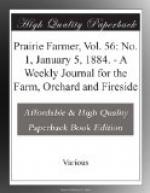One of the greatest burdens which the creamery business has to carry to-day is the excessive number of its creameries beyond legitimate demands. The co-operative idea, so far as it enters into this business, implies the most profitable use possible of the resources employed in it both of patron and creamery owner, and a fair and equitable distribution of the profits. Said a large creamery owner to me recently, “I find the comparative value of my butter steadily decreasing from year to year. I have the same territory, the same butter-makers, the same patrons, substantially, but my butter is not up in quality and price as it used to be. I ascribe it to the excessive competition prevailing in it, i.e., it is one of its results. I have lost my influence over patrons in securing the best quality of cream. If I make any criticism of their modes or practices they say to me, ’Mr. ——, if you do not want my cream I will let the other creamery have it. Do just as you like about it; take it or leave it.’” But the loss of one or two cents a pound on the net proceeds of a season means five or ten per cent of its value, or of the entire season’s results enough difference to make any community in a few years rich or poor, thrifty or unthrifty, according to the circumstances in the case.
Further: the idea of co-operation implies the doing of equal and exact justice to all included within the co-operative limits. This, an excessive and unprincipled competition greatly interferes with. It can properly be demanded by every fair and honest patron of a creamery that every other patron should be as fair and honest as himself. Indeed, this is an essential part of the implied contract. But in the case of excessive competition no restraints can be imposed and no penalties can be made to follow attempts to violate the principles of equity, except the possible inconvenience of changing from one creamery to another. The straight and honorable patron is powerless; the owner of the creamery is powerless; and the co-operative element is rendered a nullity.
Further: the co-operative element, in the relations of creamery and patrons, requires that the price of milk or cream shall vary with the market price of the finished product. Contracts for the future are mere speculation, as a rule. If the transaction is large and the turn of the market unfavorable to the creamery, ruin is liable to come to the business, and loss and disaster follow to all concerned. If the turn of the market should be the other way, among the numerous patrons there is sure to be more or less dissatisfaction and a more or less breaking up of the condition of friendly reciprocity which should exist between creamery and patron. Patrons may damage their own interest by exacting too much from the creamery as well as by accepting too little, and a greedy grasping after an unreasonable share of the profit on the part of the creamery owner is sure to bring retaliation, disturb cordiality of feeling, and bring loss to all concerned.




